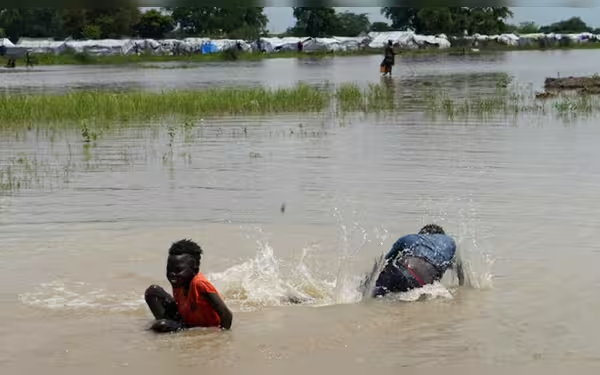Saturday, November 16, 2024 05:55 PM
South Sudan Floods Displace 379,000 Amid Humanitarian Crisis
- 1.4 million affected by catastrophic flooding in South Sudan.
- Over 379,000 people displaced, with rising malaria cases.
- Political stagnation complicates humanitarian efforts in the region.
 Image Credits: brecorder
Image Credits: brecorderSouth Sudan faces catastrophic flooding affecting 1.4 million, displacing 379,000, amid rising malaria and political instability.
In recent weeks, South Sudan has been grappling with catastrophic flooding that has impacted approximately 1.4 million individuals, leading to the displacement of over 379,000 people. This alarming situation has been reported by the United Nations, which has also raised concerns about a significant rise in malaria cases in the region. South Sudan, known as the world’s youngest country, is particularly susceptible to the effects of climate change, and the current flooding is being described as the worst the nation has faced in decades, especially in its northern regions.
The United Nations Office for the Coordination of Humanitarian Affairs (OCHA) has indicated that the floods have affected 43 counties and the disputed Abyei region, an area claimed by both South Sudan and Sudan. In a statement released late on Friday, OCHA noted, "Over 379,000 individuals are displaced in 22 counties and Abyei." The health system in several states is reportedly overwhelmed due to a surge in malaria, which is further complicating the already dire situation in flood-affected areas.
Since gaining independence from Sudan in 2011, South Sudan has been plagued by ongoing instability, violence, and economic challenges, compounded by climate-related disasters such as droughts and floods. The World Bank recently highlighted that the current flooding is exacerbating an already critical humanitarian crisis characterized by severe food insecurity, economic decline, and ongoing conflicts. The situation has been worsened by the influx of several hundred thousand people fleeing the conflict in Sudan.
According to the UN’s World Food Programme, more than seven million people in South Sudan are facing food insecurity, with 1.65 million children suffering from malnutrition. This alarming statistic underscores the urgent need for humanitarian assistance in the region.
Adding to the complexity of the situation, South Sudan is facing another period of political stagnation. In September, the president’s office announced yet another extension of the transitional period established in a 2018 peace deal, pushing elections back by two years to December 2026. Key elements of this transitional agreement, such as the establishment of a constitution and the unification of rival forces led by President Salva Kiir and his opponent Riek Machar, remain unfulfilled. This delay has left both local and international partners, as well as the United Nations, frustrated. UN envoy Nicholas Haysom described the situation as a "regrettable development," emphasizing the need for all parties involved to seize the opportunity to make this extension the last and to deliver the peace and democracy that the people of South Sudan deserve.
Despite its abundant oil resources, South Sudan's vital revenue streams have been severely impacted, particularly after an export pipeline was damaged in neighboring Sudan earlier this year. This has further complicated the nation’s economic recovery efforts.
The situation in South Sudan is dire, with millions affected by flooding and food insecurity, compounded by political instability. The international community must rally together to provide the necessary support and resources to help the people of South Sudan navigate through these challenging times. It is crucial that both humanitarian aid and political solutions are prioritized to ensure a brighter future for this struggling nation.













